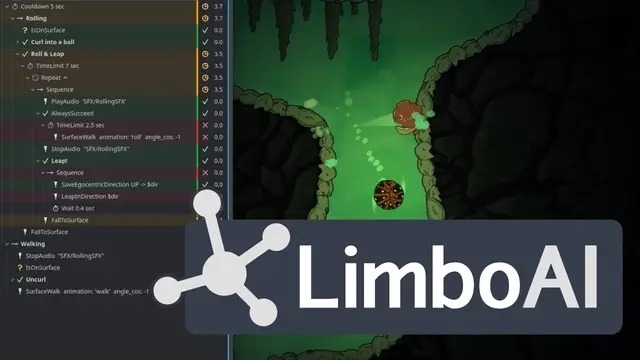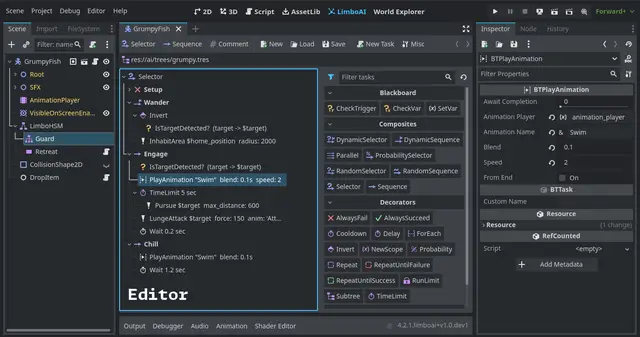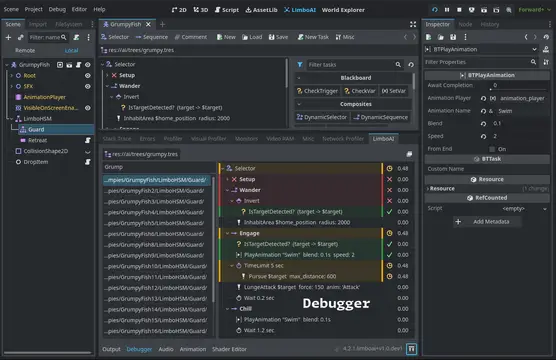Install Asset
Install via Godot
To maintain one source of truth, Godot Asset Library is just a mirror of the old asset library so you can download directly on Godot via the integrated asset library browser




Quick Information

LimboAI is an open-source C++ module for Godot 4 providing a combination of Behavior Trees and State Machines for crafting your game’s AI. It comes with a behavior tree editor, built-in documentation, visual debugger, and more! While it is implemented in C++, it fully supports GDScript for creating your own tasks and states. The full list of features is available on the LimboAI GitHub page: https://github.com/limbonaut/limboaiBehavior Trees are powerful hierarchical structures used to model and control the behavior of agents in a game (e.g., characters, enemies, entities). They are designed to make it easier to create complex and highly modular behaviors for your games.This release works with Godot 4.2. Currently, GDExtension version supports only exports for Linux, Windows, macOS and Web.

LimboAI - Behavior Trees & State Machines for Godot 4
LimboAI is an open-source C++ plugin for Godot Engine 4 providing a combination of Behavior Trees and State Machines, which can be used together to create complex AI behaviors. It comes with a behavior tree editor, built-in documentation, visual debugger, extensive demo project with a tutorial, and more! While it is implemented in C++, it fully supports GDScript for creating your own tasks and states.
🛈 Supported Godot Engine: 4.2

Behavior Trees are powerful hierarchical structures used to model and control the behavior of agents in a game (e.g., characters, enemies). They are designed to make it easier to create rich and highly modular behaviors for your games. To learn more about behavior trees, check out Introduction to Behavior Trees and our demo project, which includes a tutorial.
Demonstration

🛈 Demo project lives in the
demofolder and is available separately in Releases. Rundemo/scenes/showcase.tscnto get started. It also includes a tutorial that introduces behavior trees through illustrative examples.
Videos
Features
Behavior Trees (BT):
- Easily create, edit, and save
BehaviorTreeresources in the editor. - Execute
BehaviorTreeresources using theBTPlayernode. - Create complex behaviors by combining and nesting tasks in a hierarchy.
- Control execution flow using composite, decorator, and condition tasks.
- Create custom tasks by extending core classes:
BTAction,BTCondition,BTDecorator, andBTComposite. - Built-in class documentation.
- Blackboard system: Share data seamlessly between tasks using the
Blackboard.- Blackboard plans: Define variables in the BehaviorTree resource and override their values in the BTPlayer node.
- Plan editor: Manage variables, their data types and property hints.
- Blackboard scopes: Prevent name conflicts and enable advanced techniques like sharing data between several agents.
- Blackboard parameters: Export a BB parameter, for which user can provide a value or bind it to a blackboard variable (can be used in custom tasks).
- Inspector support for specifying blackboard variables (custom editor for exported
StringNameproperties ending with "_var").
- Use the
BTSubtreetask to execute a tree from a different resource file, promoting organization and reusability. - Visual Debugger: Inspect the execution of any BT in a running scene to identify and troubleshoot issues.
- Visualize BT in-game using
BehaviorTreeViewnode (for custom in-game tools). - Monitor tree performance with custom performance monitors.
- Easily create, edit, and save
Hierarchical State Machines (HSM):
- Extend the
LimboStateclass to implement state logic. LimboHSMnode serves as a state machine that managesLimboStateinstances and transitions.LimboHSMis a state itself and can be nested within otherLimboHSMinstances.- Event-based: Transitions are associated with events and are triggered by the state machine when the relevant event is dispatched, allowing for better decoupling of transitions from state logic.
- Combine state machines with behavior trees using
BTStatefor advanced reactive AI. - Delegation Option: Using the vanilla
LimboState, delegate the implementation to your callback functions, making it perfect for rapid prototyping and game jams. - 🛈 Note: State machine setup and initialization require code; there is no GUI editor.
- Extend the
Tested: Behavior tree tasks and HSM are covered by unit tests.
GDExtension: LimboAI can be used as extension. Custom engine builds are not necessary.
Demo + Tutorial: Check out our extensive demo project, which includes an introduction to behavior trees using examples.
First steps
Follow the First steps guide to learn how to get started with LimboAI and the demo project.
Getting LimboAI
LimboAI can be used as either a C++ module or as a GDExtension shared library. GDExtension version is more convenient to use but somewhat limited in features. Whichever you choose to use, your project will stay compatible with both and you can switch from one to the other any time. See Using GDExtension.
Precompiled builds
- For the most recent builds, navigate to Actions → All Builds, select a build from the list, and scroll down until you find the Artifacts section.
- For release builds, check Releases.
Compiling from source
🛈 For GDExtension: Refer to comments in setup_gdextension.sh file.
- Download the Godot Engine source code and put this module source into the
modules/limboaidirectory. - Consult the Godot Engine documentation for instructions on how to build from source code.
- If you plan to export a game utilizing the LimboAI module, you'll also need to build export templates.
- To execute unit tests, compile the engine with
tests=yesand run it with--test --tc="*[LimboAI]*".
Using the plugin
- Online Documentation
- First steps
- Introduction to Behavior Trees
- Creating custom tasks in GDScript
- Sharing data using Blackboard
- Accessing nodes in the scene tree
- State machines
- Using GDExtension
- Using LimboAI with C#
- Class reference
Contributing
Contributions are welcome! Please open issues for bug reports, feature requests, or code changes. Keep the minor versions backward-compatible when submitting pull requests.
If you have an idea for a behavior tree task or a feature that could be useful in a variety of projects, open an issue to discuss it.
Social
Need help? We have a Discord server: https://discord.gg/N5MGC95GpP
I write about LimboAI development on Mastodon: https://mastodon.gamedev.place/@limbo.
License
Use of this source code is governed by an MIT-style license that can be found in the LICENSE file or at https://opensource.org/licenses/MIT.
LimboAI is an open-source C++ module for Godot 4 providing a combination of Behavior Trees and State Machines for crafting your game’s AI. It comes with a behavior tree editor, built-in documentation, visual debugger, and more! While it is implemented in C++, it fully supports GDScript for creating your own tasks and states. The full list of features is available on the LimboAI GitHub page: https://github.com/limbonaut/limboai
Behavior Trees are powerful hierarchical structures used to model and control the behavior of agents in a game (e.g., characters, enemies, entities). They are designed to make it easier to create complex and highly modular behaviors for your games.
This release works with Godot 4.2. Currently, GDExtension version supports only exports for Linux, Windows, macOS and Web.
Reviews
Quick Information

LimboAI is an open-source C++ module for Godot 4 providing a combination of Behavior Trees and State Machines for crafting your game’s AI. It comes with a behavior tree editor, built-in documentation, visual debugger, and more! While it is implemented in C++, it fully supports GDScript for creating your own tasks and states. The full list of features is available on the LimboAI GitHub page: https://github.com/limbonaut/limboaiBehavior Trees are powerful hierarchical structures used to model and control the behavior of agents in a game (e.g., characters, enemies, entities). They are designed to make it easier to create complex and highly modular behaviors for your games.This release works with Godot 4.2. Currently, GDExtension version supports only exports for Linux, Windows, macOS and Web.






